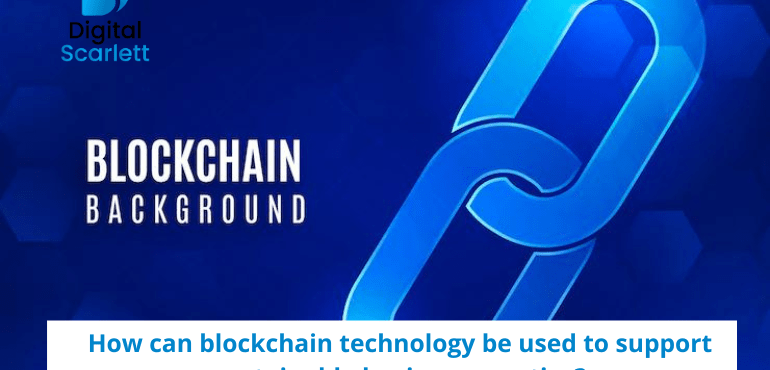Introduction to Blockchain: How can features of blockchain support sustainability efforts? Blockchain is an index of records called blocks that hold data publicly and in recorded order. The data is encrypted using cryptography to assure that the privacy of the user is not compromised and information cannot be changed. The data is kept and handled in a decentralized way thus no central authority is the only decision maker. Instead, most decisions are established on a consensus of all the participating nodes of the network scattered all over the world.
Features of Blockchain that support sustainability efforts:
There are many ways by which blockchain technology be used to support sustainable business practices some of them are as follows:
Also read: How can blockchain technology be used to support sustainable business practice?
Blockchain and Immutability
Making immutable registers is one of the primary importance of Blockchain. Any concentrated database is destined for hacks and scams since it needs belief in some third-party negotiator to hold the database safe.
Blockchain like Bitcoin keeps its registers in a never-ending form of forwarding momentum. Every node on the approach carries a replica of the digital register. To add a dealing every node requires to review of its reality. If the majority believes it’s useful, then it’s counted to the register. This facilitates clarity and makes it corruption-proof.
Another point is that, once the transaction blocks get counted to the register, no one can just shift back and modify them. Therefore, any user on the network won’t be competent to revise, delete, correct, and modernize it.
Blockchain and environmental sustainability
Blockchain technology works in the design of a circulated record approach where data, operated in communication or transactions, are maintained in a publicly understood network of digital blocks (Moll & Yigitbasioglu, 2019). Each of these blocks possesses a digital signature and timestamp. Which causes the respective blocks almost unchangeable (Kokina et al., 2017; Nakamoto, 2008). The digital blocks are organized together following a complicated mathematical sense—a technique called ‘hashing’ (Nakamoto, 2008)—to form a chain of blocks, hence the name blockchain (Angelis and da Silva, 2019; Harris & Wonglimpiyarat, 2019).
Blockchain applications are being generated according to a peer-to-peer reason in which associations can exchange goods, benefits, and data without the requirement of central bodies to confirm identity, validate transactions, or implement commitments or at least by dismissing the need for multiple intermediaries as it occurs today. At a first level, this may allow gains in efficiency and lower costs for businesses and other organizations by permitting more secured marketings that are disseminated and synchronized digitally across several distinct but rarer parties (Davidson et al., 2016).
Also read: FRANCHISE WEBSITES & WEB DESIGN
SERVICES
Blockchain and economic growth sustainability
Utilizing blockchain to follow transactions between nations and individuals is a way to handle three of the most critical questions related to sustainable development.
Inclusion, faith, and multilateralism are crucial problems, and these will continue to be addressed for decades to come.
To fulfill this, governments, civil society, academia, and non-governmental associations must see new methods to handle these challenges and harness the ability of blockchain to facilitate inclusive growth.
This way, blockchain can help sustainable development and the United Nations’ SDGs.
Constructive Footprint in digital assets
This is very useful for enterprises such as banking and healthcare. All the investments are seen from the beginning. For example, in healthcare, we can trace back the chronology of the patient to assist in a better understanding of the disease.
Also read: Digital Marketing Companies in Chandigarh | Best Digital Marketing services
Avoiding leaks in Data and safety from hacking
Blockchain technology assists in ensuring data and facts and it directs to no leakage in data.
Data violations result in failure of faith, impaired reputations, adverse responses, weakened connections, financial suffering, and failure of customers. When entrusted with personal and sensitive details, the responsibility to save and accumulate them securely is extremely necessary. This responsibility should not be an afterthought despite a trustworthy and efficient preventative approach.
To mitigate facts breaches completely, we can prevent them from happening in the first place. You can specify employee access to sensitive data and audit how data is accessed, and encrypt kept data and networks. And intensify passwords as preventative measures. Associations that don’t have these safety standards in place can meet bulky penalties down the line. Multiple enterprises like recruitment and healthcare have shifted towards blockchain for the considerable advantages it delivers.
Also read: How To Choose Digital Marketing Course In Mohali | Digital Scarlett
Conclusion
The blockchain is a dispersed register that sustains a circular economy by enhancing traceability and transparency.
Similarly, it administers companies in reducing their carbon footprints via enhanced carbon emission trading and accelerated clean energy trading.
I hope you gain all the facts which I have discussed in the overhead section. Also, This enables you to understand how important is blockchain technology to help sustainable business practice in today’s business scenario. We are at Digital Scarlett best blockchain solution agency in India.
